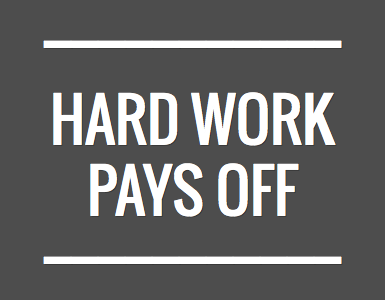[SOCIAL EXPERIMENT] Do Bonuses And Penalties Pay Off? - by chrisadventures
In which case would you work harder? Receive $100,- today no matter your work effort or receive $50,- now and receive another $50,- at the end of the day dependent on your work effort? How to influence the behaviour of an employee is a topic many institutions have to face. A question that can arise here is why the employee has to be guided in the first place. Apparently, the employee's behaviour is often not in line with an employer's desires which results into a welfare loss (inefficient outcome). Therefore, either the desire or the behaviour has to be adjusted.
Together with two other students, I did a social experiment and we've focused on the effect of bonuses and penalties on work effort by employees. The main question stated: "Does the provision of bonuses and penalties imposed on employees result into a significant increase of work effort by employees?" We assumed that employees want to maximize the work effort of employees while employees want to maximize their wage by taking into account the work effort. I mean, people prefer not to work 50 hours per week or focus on their work the whole day long. So, we assumed work effort to be a cost, it's limited in a way and tends to be minimized to a certain extent.

Set-Up
We had 40 players (N=40) in our computer simulation. 20 were assigned to be employers and 20 assigned to be employees. We created three major settings (each consisting of 5 playrounds), with each different rules to play by. The employers were to set up a contract with the amount of wage a worker could get and an expected worker’s effort. The worker’s effort defined the employer profit. The workers were to respond by contributing a certain work effort. The worker could accept the contract, so that he could get the proposed payment, or decline, so that nobody got a profit/payment. If accepted, the workers had to choose how much effort the worker would put in his work. The higher the effort the higher the costs to the employee and the higher the profit of the employer. Both employer and worker have an incentive to maximise their own profit, because the higher the cumulative profit (of all rounds) of the participant, the higher the real life payment which we assigned to the three participants with the highest cummulative outcome.
- Setting 1 consisted of contracts without penalties and bonuses and each round workers were employed to a different employer.
- Setting 2 was the same as round 1, but this time workers were randomly assigned to the same employer for all the five rounds.
- Setting 3 consisted of contracts with penalties and bonuses and this time workers and employers were assigned and coupled for all five rounds.Take into account that trust plays a strong role because once the contract was offered and accepted the wage will be paid despite the chosen worker's effort by the employee.
Example

Setting 1 and 2:
Payoff worker: wage - worker cost of effort.
Payoff employer: employer value of effort - wage.
Setting 3:
Payoff worker: wage + bonus - worker cost of effort - penalties.
Payoff employer: employer value of effort + penalties - bonus - wage.
If we look at figure 1, an employee might have been offered a contract in round 1: expected worker's effort: $8,- and offered wage: $45,-.
If the worker accepts the contract and puts in work effort 8 then
The worker earns: $45 - $13 = $32 and the employer earns $80 - $45 = $35. This would be an efficient outcome resulting into the highest welfare to both actors.
But individually seen, it's attractive to choose work effort 1 because then: the worker earns: $45 - $0 = $45 and the employer would earn $10 - $45 = -$35,-. This is inefficient.
Findings
We found that the worker's effort is higher in cases where bonuses and penalties are in place.

- Trust and reputation play a strong role in work effort. In the case were workers were assigned to the same employer for all five rounds, they tended to choose way higher work effort because it's important to have a good reputation to receive good future contracts and high future payoffs. In the case of bonuses and penalties, the employers also gave the agreed bonus if workers lived up to the expected worker's effort. If not, the worker wouldn't trust getting the bonus in later rounds and respond by giving low effort (which is negative to both parties). A peculiar thing is the performance in round 5. This was way lower because the performance of either employers (bonuses, penalties) or employees in round 5 had no effects on future payouts. This resulted in distrust and egoism. This led to inefficient outcomes.
- Bonuses and penalties positively affect payoffs because the chosen worker's effort will be punished in case workers don't live up to the expected work effort. The employer will simply not give the agreed bonus or give a penalty.
Conclusion
In our nature we're all profit and utility maximizing. As long as our effort does not influence our payoffs and nobody notices how we perform, we tend to be lazy in a way. We wouldn't perform at our highest potential because there's a cost if we do so. High work effort, long working days or highly physical work result into a so-called "utility loss". Without the right motivation, our self-interest results into inefficient outcomes. But the right motivation can be created by a win-win situation. I'm not saying that this should be money at all times but a reward or punishment will motivate workers to live up to certain expectations. So, if you're looking to maximize your potential outcomes, take these findings into account and value the role of trust, reputation and your chosen work effort. Hard work and living up to the employer's expectations pays off and results into the highest welfare outcomes!

___________________________________________________

Enjoyed reading this re-post and would you like to read more about Economics, Policy, Life, Psychology, Travelling and/or Adventure? Follow @chrisadventures!
Nice article 👍🏻
great, thanks for reading @janreyqm1!
Cool analysis, awesome subject to debate and good methodology!
Nowadays every employer seems to be looking for workers that are "self motivated" and have a "great attitude" which are very fun ways of saying "we're not gonna be paying that great", but not many employers are willing to bump that pay based on how valuable the employee's work was, even thought that value is usually easily quantifiable in the business world.
There's actually another whole subject of analysis on what job stability brings to the table, allowing employees to benefit from medical care, making credits etc based on having a stable job, even though the pay isn't that great.
There's probably a lot more to these kind of processes. I mean, a lot more factors would be of influence on their employer performance, BUT... I think that this shows nicely how these two factors are of influence. Having a stable job, for example, is also worth alot to someone and feels like a trigger too. I love how economic/finance is related to psychology and sociology as well. Approaching it from that perspective creates a whole new view on businesses! Anyways, thanks for your reply and thanks for reading !
It was a great read man, enjoyed it! Keep it coming :)
Wow
thanks for reading ;P
right